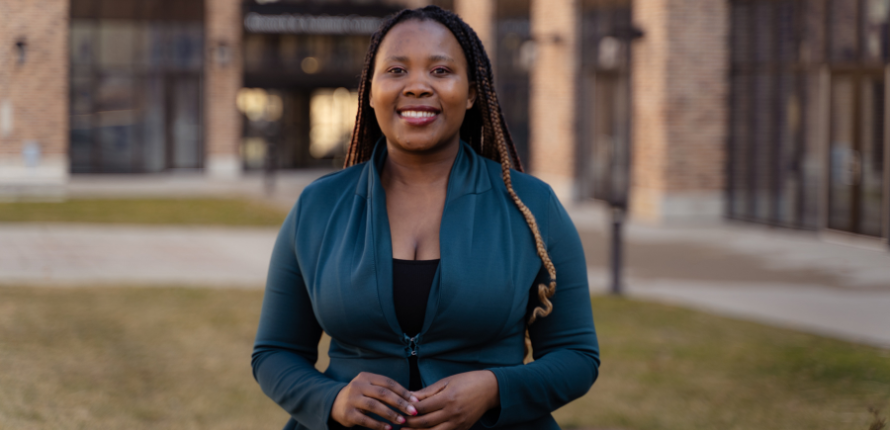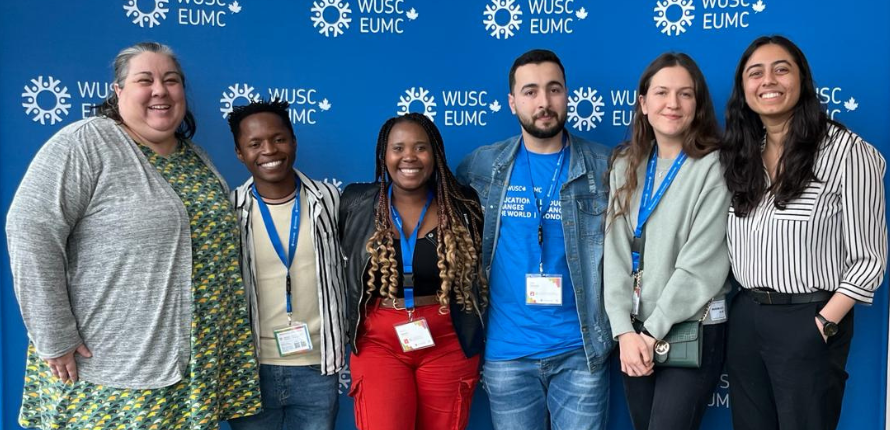We use cookies on this site to enhance your experience.
By selecting “Accept” and continuing to use this website, you consent to the use of cookies.
Search for academic programs, residence, tours and events and more.
Feb. 27, 2024
Print | PDFIn theory, refugee settlements are meant to provide short-term sanctuary to individuals fleeing violence or persecution in their home country. But complicated immigration policies often prevent refugees from resettling elsewhere, leaving thousands stranded and vulnerable in settlement camps indefinitely.
This is a reality that Wilfrid Laurier University Social Work student Stellah Nikuze is working to change.
Nikuze recently accepted a two-year appointment to the Refugee Advisory Group (RAG), part of the Consultations on Resettlement and Complementary Pathways (CRCP) of the United Nations High Commissioner for Refugees (UNHCR). RAG is the official body of refugee representatives at the CRCP, an annual event that brings international partners in government, academia, the private sector and non-governmental organizations together to discuss and advance resettlement issues.
With lived experience as refugees, RAG members act as advisors in the CRCP planning process and promote meaningful participation in decision-making processes related to regional, national and global refugee issues. Nikuze is also the co-founder of Hodari Foundation, a non-governmental organization that operates in the Kyaka II Refugee Settlement in southwestern Uganda, and president of the World University Service of Canada (WUSC) chapter at Laurier’s Brantford campus.
Below, Nikuze discusses her role within the Refugee Advisory Group and her passion for advancing policies to better support the unique needs of refugees around the world.
The Refugee Advisory Group is the main body of regional, national and global refugee representatives influencing policy decision-making at the Consultations on Resettlement and Complementary Pathways. RAG liaises with refugees, NGOs and the UNHCR to analyze the immigrational pathways and social policies of the countries providing refuge.
RAG members are refugees with lived experience. As a group, we represent the needs and interests of refugees, many who do not speak out about their experiences, which can lead to further human rights violations, trauma and marginalization. RAG also looks at whether countries providing refuge are upholding UNHCR policies. It is one thing for a country to accept refugees, but meeting their needs – like housing, trauma support, cultural support, and medical needs – is another. Refugees have already had their rights violated in their home countries. RAG is trying to make sure their human rights are upheld in the places they take refuge.
My parents fled the genocide in Rwanda during the early 1990s and ended up in southwestern Uganda at the Kyaka II refugee settlement, operated by the United Nations. I was born and raised there, and lived my life in the settlement until I came to Laurier in 2023 for my degree.

Stellah Nikuze at Laurier's Brantford campus.
For refugees like my parents and siblings, there is no hope of returning to Rwanda, and it is not easy to resettle in Uganda or another country. They are stuck, basically. Thousands of refugees experience this reality and that’s why policy change is so important. There need to be policies and pathways in place to allow refugees to find hope and build a life beyond a settlement. Life in a settlement isn’t living. At Kyaka II, I saw domestic violence, poverty, illiteracy, and the denial of basic human rights, especially for women, girls, and children. It has haunted me, and I want to be able to help make a change.
I co-founded Hodari Foundation in 2020. As a refugee-led organization, Hodari Foundation is focused on empowering vulnerable populations within Kyaka II, including women, adolescent girls, unaccompanied minors, and individuals living with disabilities through education and vocational skills.
Hodari offers a three-month training program in tailoring, catering, and hairdressing. Each cycle, about 20 students graduate from our programs with a skill they can use to find work with local businesses. Hodari also offers a micro-agriculture program that teaches people how to grow mushrooms to provide a nutritious food option to alleviate hunger and a product to sell. Both program streams foster resilience, self-sufficiency, and financial independence for graduates.
Hodari Foundation also partners with the World Food Program, faith-based community groups and other non-governmental organizations to help us fulfill Hodari’s mission to defend the human rights and well-being of vulnerable groups within Kyaka II. At Hodari, we know there is little hope for refugees to return home or be resettled in Uganda or elsewhere, but we can offer ways for them to elevate their lives through education, training, empowerment, and community.
Being involved with WUSC at Laurier means that I can help bring awareness to the challenges that refugees face. I have been a refugee; I have walked in their shoes. One of WUSC’s signature programs is the Student Refugee Program, which provides a life-changing scholarship for refugee youth to study at a Canadian university. Laurier is a partner of WUSC’s Student Refugee Program. Each term, each student pays a small levy – about the price of a cup of coffee – to sponsor refugee youth on campus. Members of the WUSC club at Laurier’s Brantford campus visit classrooms and host booths to educate the campus community about the challenges refugees face and why it is important to advocate for policy change.

Nikuze, centre, and colleagues at the WUSC International Forum in Ottawa.
Recently, I attended the World University Service of Canada’s International Forum in Ottawa, where I served as a panelist on the topic of leveraging partnerships to achieve the United Nations’ Sustainable Development Goals. It was empowering to be able to share my experience as a young female leader working to make change for vulnerable populations. I have also joined the nomination committee for WUSC’s Board of Directors; committee members can make recommendations for individuals to fill vacant positions on the board.
I am grateful for the opportunity to continue advocating for education to change the lives of refugee youth.
World leaders should see refugees as contributors and not a burden. They should allow refugees to move freely, work, and access public services like education and healthcare.
Additionally, meaningful participation and engagement among refugee groups should be a priority for all stakeholders involved with supporting refugee populations, including the UNCHR, NGOs, and host countries. World leaders need to invest in refugee-led organizations because they understand the refugee experience. When refugee-led organizations provide service, it comes from the heart and shared experience. We can be the voices of those who are too afraid to speak up. We can advocate for change and represent the rights and needs of refugees at international tables to advance social policy change.